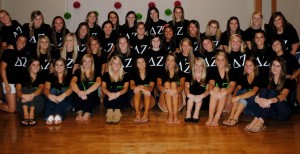 For any student in a fraternity or sorority, they wear the letters on their chest with pride. They are proud to be part of a Greek organization that can help them grow into an adult and help those around them. But for many non-Greek students and professors the letters prompt jokes and stereotypes that they express loudly and offensively. For Megan Sweeney, a sister of the Delta Zeta sorority, one professor took her first day of classes this semester a little too far.
For any student in a fraternity or sorority, they wear the letters on their chest with pride. They are proud to be part of a Greek organization that can help them grow into an adult and help those around them. But for many non-Greek students and professors the letters prompt jokes and stereotypes that they express loudly and offensively. For Megan Sweeney, a sister of the Delta Zeta sorority, one professor took her first day of classes this semester a little too far.
Sweeney came through College PanHellenic Council (CPC) recruitment in the Spring of 2012.
“I came through because I wanted to make those college memories and be able to help others around me,” said Sweeney. “I couldn’t wait to be a part of an organization that meant a lot to others.”
By the semester of Fall 2013, Sweeney had done more than one hundred hours of community service for Delta Zeta and held chair and executive positions on her board. So when the first week of classes came, she was once again ready to represent the organization that meant the most to her.
Sweeney walked into her COMM 201 class and was told to play an icebreaker with the rest of the class, a tactic that is common for most first day of classes so students can get to know one another. When Sweeney walked up to the front of the class to describe herself, her professor shouted out, “So you’re an easy DZ?”.
“I have never had a professor talk to me like that in front of a class,” Sweeney said. “I could not have been more hurt and embarrassed.”
Sweeney quickly switched out of her class and reported this professor to student ethics. After a month of investigation, student ethics committee found the professor not guilty.
But this is not the only incident with this professor and a Greek woman. In the fall of 2011, Ashley Baldwin, also a sister of the Delta Zeta sorority, was called an “Easy DZ” by the same professor as Sweeney.
“At first I took it as a joke, but once she kept saying it every time I went up to present in front of the class, she would keep calling me names,” said Baldwin.
Baldwin did not turn this professor into student ethics or the Fraternity and Sorority Life office when it occurred.
“I didn’t think anyone could do anything so I just tried to still be the best person I can and stay strong,” said Baldwin.
If these incidences are happening with one sorority, what about the other 21 fraternities and sororities on this campus?
Megan Black, a member of the CPC executive board at WCU, says Greek life at Western Carolina University makes up about 10 percent of its population; almost 1000 students. And with 22 total organizations it should be a force that is recognized and appreciated.
For a lot of Greeks, their organizations are their permanent home. They do not have the power to go home as often as those who live three hours away. Paige Diemer is a Greek woman from Bradenton, Fla. and says WCU is her home.
“I don’t care what professors think of me when I walk into class. I have been looked at negatively in my classes by both professors and students. That has never stopped me from wearing my letters. My organization is my home,” said Diemer.
WCJ surveyed around 30 Greek men and women about if they have ever felt like a professor judged them based on the letters on their chest during the school year. 18 out of those 30 said they try to stay away from wearing letters during the first week of classes to avoid a professor that they heard does not like men and women in Greek organizations.
One of the women who said they did not mind wearing letters during the school year was junior Megan Mastro.
“I don’t mind wearing them even if a professor doesn’t like us,” said Mastro. “I am proud of who I am, and why do professors get to judge me if I am not allowed to judge them?”
With quota being raised to 60 for all CPC organizations, there will now be more Greek affiliated women in the classrooms. Faculty will most likely have at least one Greek student in their class.
From what WCJ understands, this type of incident has never been reported before. It does not mean it has happened to other students in the past.
The reporter is a member of the WCU Greek life.


